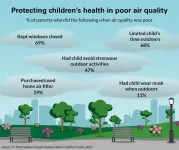(Press-News.org) (COLUMBUS, Ohio) – Attention-deficit/hyperactivity disorder (ADHD) is among the most common pediatric neurodevelopmental disorders. In 2019, nearly 10% of United States (U.S.) children had a diagnosis of ADHD. Approximately 3.3 million children, or roughly 5 out of every 100 children in the U.S., are currently prescribed medication for ADHD.
In a new study, published today in Pediatrics, researchers at the Center for Injury Research and Policy and Central Ohio Poison Center at Nationwide Children’s Hospital investigated the characteristics and trends of out-of-hospital ADHD medication errors among people younger than 20 years old reported to U.S. poison centers from 2000 through 2021.
According to the study, the annual number of ADHD-related medication errors increased 299% from 2000 to 2021. During the study period, there were 87,691 medication error cases involving ADHD medications as the primary substance among this age group reported to U.S. poison centers, yielding an average of 3,985 individuals annually. In 2021 alone, 5,235 medication errors were reported, equalling one child every 100 minutes. The overall trend was driven by males, accounting for 76% of the medication errors and by the 6-12-year-old age group, accounting for 67% of the errors. Approximately 93% of exposures occurred in the home.
Among medication errors involving ADHD medications as the primary substance, the most common scenarios were:
54% – “Inadvertently taken/given medication twice”
13% – “Inadvertently taken/given someone else’s medication”
13% – “Wrong medication taken/given”
“The increase in the reported number of medication errors is consistent with the findings of other studies reporting an increase in the diagnosis of ADHD among U.S. children during the past two decades, which is likely associated with an increase in the use of ADHD medications,” said Natalie Rine, PharmD, co-author of the study and director of the Central Ohio Poison Center at Nationwide Children’s Hospital.
In 83% of cases, the individual did not receive treatment in a health care facility; however, 2.3% of cases resulted in admission to a health care facility, including 0.8% to a critical care unit. In addition, 4.2% of cases were associated with a serious medical outcome. Some children experienced agitation, tremors, seizures, and changes in mental status. Children younger than 6 years old were twice as likely to experience a serious medical outcome and were more than three times as likely to be admitted to a health care facility than 6-19-year-olds.
“Because ADHD medication errors are preventable, more attention should be given to patient and caregiver education and development of improved child-resistant medication dispensing and tracking systems,” said Gary Smith, MD, DrPH, senior author of the study and director of the Center for Injury Research and Policy at Nationwide Children’s Hospital. “Another strategy may be a transition from pill bottles to unit-dose packaging, like blister packs, which may aid in remembering whether a medication has already been taken or given.”
Although prevention efforts should focus on the home setting additional attention should be given to schools and other settings where children and adolescents spend time and receive medication.
Data for this study were obtained from the National Poison Data System (NPDS), which is maintained by America’s Poison Centers, formerly the American Association of Poison Control Centers (AAPCC). Poison centers receive phone calls through the national Poison Help Line (1-800-222-1222) and document information about the product, route of exposure, individual exposed, exposure scenario, and other data, which are reported to the NPDS.
The Center for Injury Research and Policy (CIRP) of the Abigail Wexner Research Institute at Nationwide Children’s Hospital works globally to reduce injury-related pediatric death and disabilities. With innovative research at its core, CIRP works to continually improve the scientific understanding of the epidemiology, biomechanics, prevention, acute treatment, and rehabilitation of injuries. CIRP serves as a pioneer by translating cutting edge injury research into education, policy, and advances in clinical care. For related injury prevention materials or to learn more about CIRP, visit www.injurycenter.org. Follow CIRP on X @CIRPatNCH.
The Central Ohio Poison Center (COPC) provides state-of-the-art poison prevention, assessment and treatment to residents in 64 of Ohio’s 88 counties. The center’s services are available to the public, medical professionals, industry, and human service agencies. COPC handles more than 37,000 poison exposure calls annually, and confidential, free emergency poisoning treatment advice is available 24/7. To learn more about COPC, visit www.bepoisonsmart.org. Follow COPC on X @OHPoisonControl and Facebook https://www.facebook.com/CentralOhioPoisonCenter.
-30-
END
The Korea Institute of Civil Engineering and Building Technology (KICT, President Kim Byung-Suk) has developed a 'Road Pothole Filtering Program' to establish an emergency road restoration system for frequent pothole occurrences.
Commonly referred to as 'the landmine of the road,' potholes are a road damage phenomenon in which parts of the asphalt sink into bowl-like depressions. Potholes occur when a significant amount of rainwater infiltrates the road surface, weakening the ground below and causing the asphalt ...
A new diagnostic scoring system, developed by renowned breast cancer experts, is now available as an easy-to-use online tool through Susan G. Komen®, the world’s leading breast cancer organization. This tool will help health care providers recognize and effectively diagnose a rare and aggressive breast cancer, inflammatory breast cancer.
The new Inflammatory Breast Cancer (IBC) Scoring System online tool is available at https://www.komen.org/ibc and may help to increase diagnostic accuracy, predict outcomes, guide treatment decisions ...
Weather data from several ships bombed by Japanese pilots at Pearl Harbor has been recovered in a rescue mission that will help scientists understand how the global climate is changing.
Crew members aboard various vessels - such as the USS Pennsylvania and the USS Tennessee - died when their battleships were targeted in December 1941. Despite these losses, many boats returned to service during the Second World War and US naval servicemen continued their daily duties, which included recording weather data.
A new research paper, published in Geoscience Data ...
Investigators found and catalogued mysterious RNA circles that are linked to brain cell identity
Findings show that circular RNA is produced by brain cells damaged in Parkinson’s and Alzheimer’s disease
Circular RNA production from one Parkinson’s gene DNAJC6 was abnormal even prior to symptom onset
Researchers are gaining new insights into neurological diseases by studying circular RNAs (circRNAs) in brain cells. A new study by investigators from the Brigham and Women’s Hospital, a founding member of the Mass General ...
A new study published in a Nature Partner Journal, npj Microgravity, finds an engineered compound given to mice aboard the International Space Station (ISS) largely prevented the bone loss associated with time spent in space. The study, led by a transdisciplinary team of professors at the University of California at Los Angeles (UCLA) and the Forsyth Institute in Cambridge, Massachusetts, highlight a promising therapy to mitigate extreme bone loss from long-duration space travel as well as musculoskeletal ...
Javier Ramón Azcón, an ICREA research professor and the leader of the Biosensors for Bioengineering group at the Institute for Bioengineering of Catalonia (IBEC), has been granted an "ERC Proof of Concept Grant." This prestigious grant is awarded by the European Research Council (ERC) and aims to explore the commercial and societal potential of research projects that have been previously funded by the ERC. Recipients use this type of funding to verify the practical viability of scientific concepts, explore business opportunities or prepare patent applications.
Ramón's project has been named "Uniink" and centers ...
ANN ARBOR, Mich. – As smoke from Canada's historic wildfires triggers poor air quality alerts across the country, many parents worry about the impact on their child’s health, a new national poll suggests.
Two-thirds of parents say over the past two years they have experienced at least one day with poor or unhealthy air quality in their area, according to the University of Michigan Health C.S. Mott Children’s Hospital National Poll on Children’s Health.
In response to poor air quality alerts, most parents kept their windows closed and limited ...
It's no longer just about stopping, but how we can live with climate change. To figure this out, we must delve into our cultures, as highlighted in a special issue of The Royal Society. A study by the Complexity Science Hub points out how our history could help guide the way.
Currently, we are grappling with a global crisis convergence. Various types of threats intersect, intertwine, and test our collective resilience, from climate change and economic inequality to political polarization. Although the scale and global reach of these challenges present new hurdles, these threats have been faced and, sometimes, overcome in the past. Societies today ...
All animals have an internal clock called a circadian clock, which is regulated by cues from their environment — but animals in zoos can be exposed to very different cues from animals in the wild. Since all animals’ circadian clocks are linked to their behavior and physiology, this could be significant to their welfare, which is crucial to maintaining captive populations of animals at high risk of extinction in the wild, like giant pandas. Scientists set out to understand how the ‘jet lag’ of living ...
Developed in 2011, MXene is a two-dimensional nanomaterial with alternating metal and carbon layers, which has high electrical conductivity and can be combined with various metal compounds, making it a material that can be utilized in various industries such as semiconductors, electronic devices, and sensors. To properly utilize MXene, it is important to know the type and amount of molecules covered on the surface, and if the molecules covered on the surface are fluorine, the electrical conductivity of decreases and the efficiency of electromagnetic wave shielding decreases. However, since it is only 1 nm (nanometer - billionth of a meter) thick, ...






